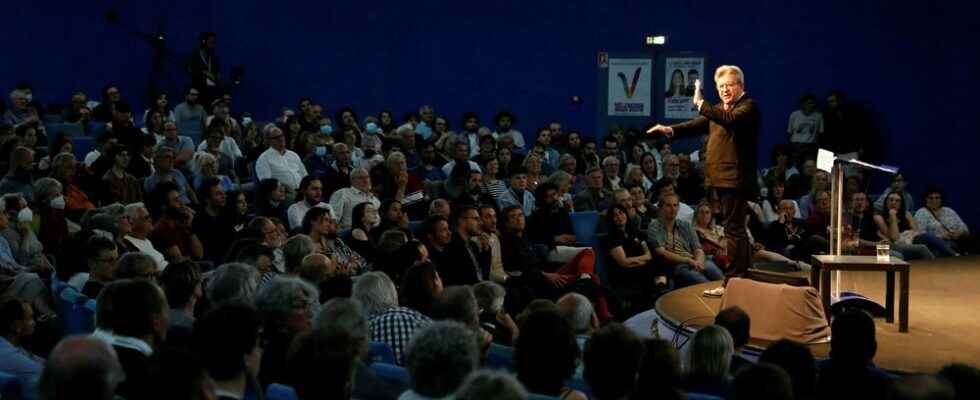The district of Little Morocco in the northern French city of Lille got its name in the 50s, when Moroccan soldiers who had fought in the French army during World War II settled here.
Ugo Bernalicis from the radical left party The Occupied France has come here to campaign.
It’s Wednesday afternoon. Then French children have time off from school and usually have leisure activities instead. On a lawn next to a high-rise building, a bouncy castle has been set up and in a stand, party functionaries offer spun sugar. The children flock, but few adults take political pamphlets or talk to the politicians there.
In the parliamentary elections, the Left Party pushes three issues in particular: the minimum wage will be increased by 15 percent to a net salary of the equivalent of SEK 15,800, the retirement age will be reduced from the current 62 to 60 years and the state will introduce a price cap on certain food and petrol.
– If we do nothing now, people will soon not be able to afford to heat their homes, not right now but this autumn. And others will not be able to afford to take the car to work, says Ugo Bernalicis.
Aïcha Cheboub works part time in a food factory and has a couple of years left until retirement. She says she notices the higher prices of basic goods such as cooking oil, pasta and rice.
– Previously, for example, you got entrails or meat bones for free from the butcher, now you have to pay for it too, she says.
– For me, the most important issue in the election is the price of food, VAT and fuel prices.
Since 2017, Ugo Bernalicis has been a Member of Parliament for one of the five constituencies in Lille. He’s pretty sure he’ll be re-elected this year. His party, with its charismatic and controversial party leader Jean-Luc Mélenchon, has emerged as the driving force behind left-wing politics in France.
After the presidential election earlier this spring, three clear political blocs crystallized: a broad left-wing bloc around Mélenchon, a liberal center-left movement led by President Emmanuel Macron, and the far right, led by Marine Le Pen.
The Left Bloc consists of the Conquered France, the Socialist Party, the Green Party, the Communist Party and a handful of small parties. In May, they gathered under the name People’s New Ecological and Social Union (Nupes). Their candidates do not compete with each other in the various constituencies and they go to the polls with a common candidate for the post of Prime Minister: Jean-Luc Mélenchon.
– This is not just an electoral cooperation. We have a common policy that breaks with the old, a common program, says Ugo Bernalicis.
The issues raised by the left-wing coalition choose to highlight are precisely the social reforms and climate change. The issues where the parties think differently are toned down. This applies, for example, to EU policy and the view of Russia.
The left-wing coalition has wind in its sails. Opinion Institute Ipsos latest survey ahead of Sunday’s election show that it has the support of 27.5 percent of voters, while Macron’s center-right alliance gets 28 percent. National rallies follow with 20 percent and the right-wing Republican Party 11 percent.
A premonition is the results from the French abroad, who have already voted. In ten of the eleven constituencies abroad, the left-wing alliance advances to the second round, against Macron. That is twice as many as in the 2017 parliamentary elections.
Bernalicis explains the strong the support that people see that a left-wing alternative can actually gain a majority and real political influence. Macron’s success has been largely due to tactical voting, either to stop Le Pen or not to cast his vote on a candidate who has no chance of advancing, he says.
The Left Alliance hopes for its own majority in the National Assembly, which would require 289 out of 577 seats. In that case, Jean-Luc Mélenchon would become prime minister and co-rule with Liberal President Emmanuel Macron.
That’s not very likely. But at the same time, Macron does not seem to have its own majority either. This means that he will have to seek support in the left-wing alliance for his policies.
– Whatever it is, it will be different than before the election. Even the worst outcome means that we become the main opposition force, says Ugo Bernalicis.
Read more:
The French left agrees behind Jean-Luc Mélenchon
Erik de la Reguera: Four big tasks for Emmanuel Macron
Facts. The French parliamentary elections
Elections to the French National Assembly are majority elections in one-man constituencies and take place on 12 June and 19 June.
In the second round of elections, the choice is between the two candidates who received the most votes in the first round.
There are 577 constituencies in France. For the own majority in the National Assembly, 289 out of 577 seats are required.
Macron’s party with coalition parties received 350 seats after the 2017 election. Now he is estimated to get between 250 and 290 seats.
The Left Alliance, for its part, hopes for its own majority. In that case, they will demand the post of prime minister. This would mean a so-called “co-habitation”, literally cohabitation, where the prime minister and the president come from different political blocs.
Turnout in French parliamentary elections is usually lower than in presidential elections. This year, it is estimated to be between 44 and 48 percent.
Show more
